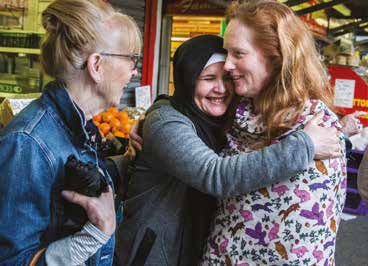The Big Picture
Right photo: Sound of Jura to Jura, from Kiels by Peter Robinson Below: Craigievar Castle, Aberdeenshire by Bill Cumming Bottom: Boreray, St Kilda by John Macadam
Digital photographs only should be sent to magazine@lifeandwork.org accompanied by details of where and when the image was taken, with full name and address, including the contact telephone number of the person who took the photograph. For reproduction purposes we are unable to accept hard copies of photographs.
Digital photographs should have a minimum size of 300 x 210mm at 300dpi.
Photographs may be reproduced in print or online by Life and Work unless a request is made not to do so. Requests can be sent in writing to Life and Work, 121 George Street, Edinburgh, EH2 4YN, or by email to magazine@lifeandwork.org

Welcoming the stranger and supporting those who seek sanctuary.
Sabine Chalmers
Coordinator Scottish Faiths Action for Refugees
Welcoming the Stranger -‘Let us not grow weary of doing good’ (Galatians 6:9)
It is unlikely that anyone reading this has not seen images of dangerously overcrowded boats in the English Channel, or people desperately trying to get on the last rescue flights from Afghanistan last summer. Every two seconds, one person is forced to flee their home; today, there are 84.2 million displaced people – twice as many as a decade ago.
“Walking in Jesus’ footsteps, we are called to embrace all people, of all nations, tribes and tongues – to be a church that reflects God’s heart for this world.”
In the midst of this, we ask ourselves, ‘How can we even start to make a difference?’
In 1989, as the Berlin Wall came down, this piece of graffiti was pasted: ‘Many small people, who in many small places, do many small things, can alter the face of the world.’ That is how we can collectively support thousands of people seeking sanctuary; through individual encounters and acts of hospitality, in turn being transformed by the friendships we make.
Faith plays an elemental role in many refugees’ lives and churches have provided a sense of belonging, hope and comfort, as well as practical support when all else has been lost. Walking in Jesus’ footsteps, we are called to embrace all people, of all nations, tribes and tongues – to be a Church that reflects God’s heart for this world. Through our new Faithful Welcome project in partnership with Faith in Community Scotland, we support, resource and equip local congregations in their work with refugees and asylum seekers, enabling them to be an integral part of community life. Find out more here www.sfar.org.uk/faithful-welcomeWe’d love to meet with you.
If it is the first time you are thinking about this as a congregation, why not mark 26th June in your diaries to celebrate Sanctuary Sunday? Use our God With Us resource which you can find on the Church of Scotland website.
Dr Murdo Macdonald
Policy Officer Society, Religion and Technology (SRT)
“How are you?”
A familiar greeting when we meet people, though if we’re completely honest, how often do we really pay attention to the response?
It is a question which has taken on a particular resonance, as many of us have faced the challenges of the pandemic, and our attention to personal wellness has become even more important.
We have been rightly concerned about the physical health of those around us, and have marvelled at the speed with which vaccines have been developed to protect the vulnerable and grateful for the ability of those in the health and social care services to look after those who fall ill.
However, have we at times lost sight of the impact that the pandemic response (lockdown and social distancing) has had on the mental wellbeing of those in our communities? One manifestation of this, is that loneliness and isolation have been exacerbated by what has happened in the last couple of years and this is now a serious public health problem.
Many of us have been working or learning from home, and have been unable to meet, even for church. While online platforms have allowed us to stay in touch to an extent, surveys indicate that a third of people in the UK have found it difficult to reconnect with friends and family following the pandemic. Furthermore, 35% feel less connected to their community than they did before and a quarter say Covid-19 has left them feeling more isolated. The virus has driven a wedge between people and their communities and deepened feelings of isolation for some key groups.
The pandemic has had a scarring effect on our health and wellbeing. We know that those who are lonely are not just sadder, but they are unhealthier, and tend to die younger. As a caring community, we as the Church need to ask what can be done, and how we can contribute to the response.
For all its familiarity, “How are you?” remains an important question – and perhaps we should pay more attention to the answer.
For our Gaelic readers
Rev Dr Rory MacLeodMinister of Strath and Sleat ’Siomadh còmhradh sna làithean seo mun seòrsa Eaglais air am bu chòir dhuinn fàs a thoirt. Chaidh mòran dhaoine a bhròsnachadh bruadaran a bhruadar agus lèirsinnean fhaicinn, a chionn ’s gum feum gach clèir plana misein a dhèanamh. Ach ’s e ceist air leth feumail a th’ ann: a bheilear deiseil fàs a bhith ann san atharrachadh a thathar ag iarraidh?
Their iomadh duine gun iarradh iad ath-bheothachadh. Ach feumar a bhith mothachail gun tig athbheothachadh Dhè tro dhòighean gu math diofraichte gach turas. Chan urrainn dhuinn a bhith an dùil gun toir an Tighearna ath-beothachadh san aon dhòigh a rinn e roimhe. Bidh e eadar-dhealaichte an ath thuras…